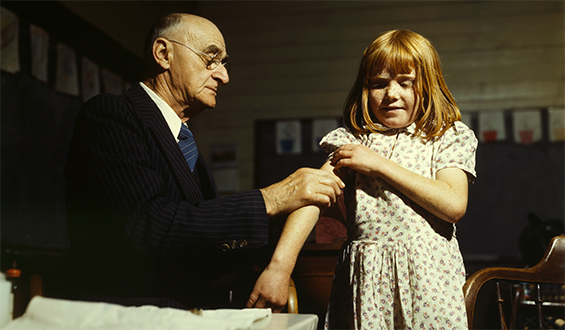 (Image: Typhoid inoculation, 1944, U.S. Office of War Information)
(Image: Typhoid inoculation, 1944, U.S. Office of War Information)
A Michigan appeals court has ruled 3-0 that parents declared unfit cannot keep their children from getting required vaccinations.
A Kent County judge had ordered that immunizations be given to four young people in foster care after a state foster care worker requested the action. Now the state appeals court has affirmed the decision, reports the Associated Press.
The mother of the children had opposed the inoculations on religious grounds, but in 2015, Judge Paul Denenfeld denied her that right, explaining that she had forfeited it. Denenfeld said the shots would benefit both the children and society.
Specifically, parents who have been judged to be “unfit” during court proceedings based on not protecting their children have no say in whether their kids are vaccinated based on religious beliefs.
The parents in question were deemed unfit by the court because of homelessness issues, unstable housing, lack of financial support, insufficient food, lack of supervision, and the mother’s substance abuse and mental health conditions. The judge in the 2014 case made the children wards of the court, removed them from their mother’s care, and arranged foster care for them, writes Virginia Gordan of Michigan Radio.
Any parent found to be unfit, said the appeals court, is not allowed to make medical decisions for their children, and that includes the administration of immunizations. They can have their parental rights reinstated after the final disposition of their child protection case.
The appeals court stated:
“That responsibility now rests with the trial court, and the trial court did not exceed its authority by ordering immunization of the children over the (mother’s) objections given that the facts proven and ascertained demonstrate that immunization is appropriate for the welfare of the children and society.”
All four of the kids are under the age of six, says Melissa Willets, writing for Parenting. She adds that the ruling will probably impact other states that have to decide who has the right to determine if a child should be immunized when the young one is a ward of the state.
The US National Center for Biotechnology Information and the National Library of Medicine in Bethesda, Maryland explain that millions of premature deaths and disfiguring illnesses have been prevented because of the astounding advances in vaccinations. Although immunizations carry unavoidable risks, the medical, social, and economic benefits are such that every state has enacted compulsory childhood vaccination laws.
In a way, state the scientists, the inoculations are becoming their own worst enemies. Because of the success of the immunizations, many have not seen the debilitating diseases they prevent and have less of a sense of the vaccinations’ importance.
But numerous parents stay away from the vaccinations because of religious or philosophical beliefs, over-perception of the risks involved, misinformation about the risks, or to establish their freedom and individualism. There is also an ongoing disputed and controversial link, some people believe, between immunizations and autism.
Almost all states now allow exemptions from vaccinations for religious beliefs, which results in state lawmakers and health departments facing a difficult challenge. Should respecting individual rights and freedoms negate protecting the public welfare?
Somehow, say the experts, states will have to find a way to ensure that the exemption process is written in a way that prevents “opt-outs of convenience,” but still allows exemptions for parents who are earnest and informed in their convictions or have genuine medical reasons.




